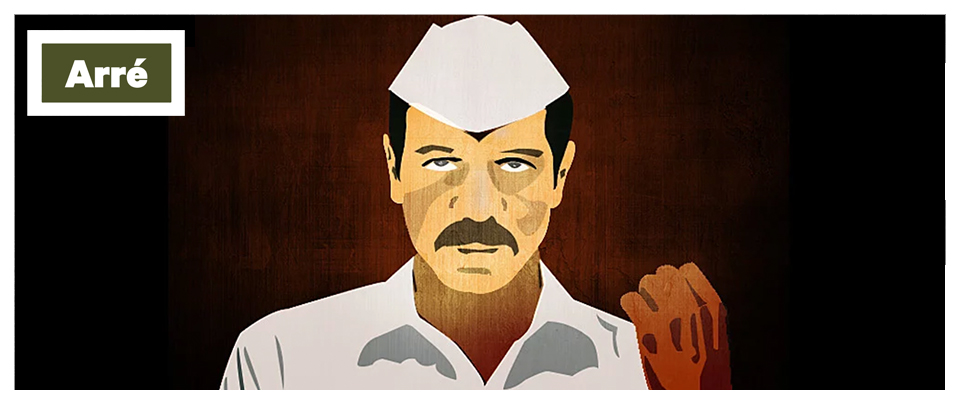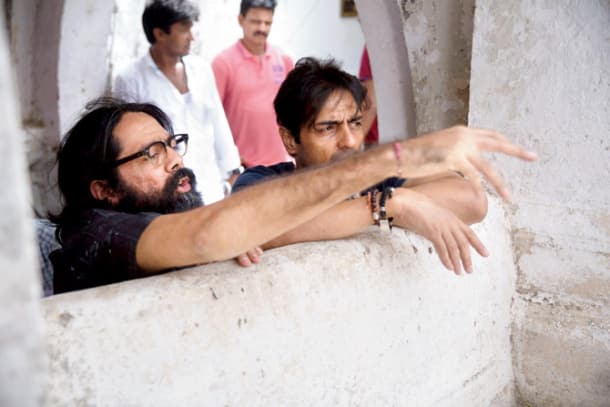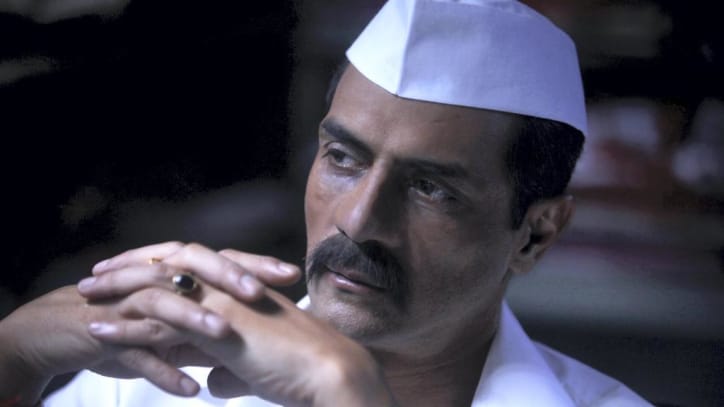Daddy Got A Godfather
Arré 08.09.2017 by Poulomi Das
In the able hands of Ashim Ahluwalia, Arjun Rampal finds a rare middle ground as the eponymous Daddy, a complex and engaging character, one that Bollywood gangster dramas have been glaringly wanting.
Daddy is a gangster film, and yet it is not.
Daddy won’t do to Gawli, what Once Upon a Time In Mumbaai did for Haji Mastan – built him up as an aspirational hero, in spite of his reality. It’s not a docudrama, despite its narrative flowing like one. Daddy is also not a commercially gentrified version of the Bollywood gangster genre, like Raees. It isn’t meant to entertain or titillate. The film has no item numbers headlined by Sunny Leone, or glamorously shot encounters showcasing the inventive imagination of an under-tapped action-director. It consciously eschews Bollywood’s star-driven, supercilious formula overpowering the gangster genre, and offers no resolution for its eponymous lead, instead stripping bare his flawed ambiguity, and investigating his humaneness. In doing so, Daddy makes us encounter Arun Gawli, once the chief adversary of Dawood Ibrahim (referred to as Maqsood bhai), instead of being complacent about telling us about him, like every other gangster film we’ve been accustomed to.
This out-of-the-ordinary predicament of not being able to slot Daddy into a well-defined box, in spite of the film comprising all the necessary ingredients for a potboiler is a dilemma that faces its director, Ashim Ahluwalia. His last film, Miss Lovely (2012), starring the ever dependable Nawazuddin Siddiqui in his first lead role, explored the criminal depths of Mumbai’s softcore- porn industry in the 1980s, managing to artfully recreate the city’s industrial past. The film’s densely layered dark narrative, its meticulous attention to detail of the period it inhabits, and stylistic production design that transformed Miss Lovely into an immersive experience also made it a festival favorite. After Miss Lovely, we didn’t know whether to classify Ahluwalia as a documentary filmmaker or an art-house director. For Ahluwalia lies somewhere in between. Just like Arjun Rampal’s Arun Gawli in Daddy.
In Daddy, Ahluwalia shifts between timelines, starting from the 1970s, up until Gawli’s conviction in 2012. His unconventional, non-linear narrative jumps forward and backward, taking the audience along on a rollercoaster of events that shaped the kingpin’s life, with first-hand recollections from friends, cops, family, and consorts of his gang, who come up with different versions of the man they remember as Gawli. The director lets their versions lead the narrative, instead of making Daddy a result of a singular interpretation. Although the director doesn’t shy away from showing Gawli as the ruthless gangster that he is (despite the limitations of certain cases being sub judice), he also doesn’t let the kingpin’s assumed monstrosity limit him in tapping Gawli’s inner benevolence.
We see the generous Gawli giving away presents to the poor residents of Dagdi Chawl during Ganesh Chaturthi, as well as the Gawli who shows traces of a future kingpin when he mercilessly shoots his childhood friend. In the film, Gawli is as much a criminal, as he is a do-gooder, fiercely protective of both, his business and the inhabitants of his home — Dagdi Chawl. Unlike the traditional treatment afforded to gangster leads, Rampal’s Gawli, is neither portrayed as an out-and-out criminal, nor as a grassroot hero on his way to redeeming himself. Instead, in the able hands of Ahluwalia, Rampal then finds a rare middle ground as Gawli, a complex and engaging character, one that Bollywood gangster dramas have been glaringly wanting. And this is essentially the film’s biggest triumph.
Just like Ahluwalia accurately captured the minutiae of the 1980s South Bombay, replete with wooden staircases, bright leather sofas, unending neon-lit corridors, and a horde of floating ferries in Miss Lovely, he bestows similar attention to minute detail upon Daddy. There are dull chawls, glittery bars, close shots of grungy, murky streets, and dilapidated buildings that instantly succeed in giving out the impression of Bombay of the 1970s, besides manufacturing claustrophobia elicited out of shots of Dagdi Chawl’s narrow streets. This authentic recreation, coupled with presenting Arun Gawli as a character without letting his reputation ruin it, further aids Arjun Rampal’s restrained and brave performance as the eponymous Daddy. (Who would’ve thought the man could act, or write?!)
Infact, Arjun Rampal does to Daddy what SRK could not do to Raees – convince you of his complexity, without making you choose sides. The stark contrast between Raees and Daddy, in spite of the former being directed by Rahul Dholakia, who boasts of a similar background as Ahluwalia, and a National Award, is that Raees took an unfathomable detour into the bastions of commercialisation and stardom, sacrificing the essence of what he set out to do – tell a story while separating fact from fiction. In letting his vision get sidetracked in favour of item numbers, mindless songs that punctuate the narrative, and letting a star be the hero, Raees, was essentially a bastardised version of Daddy, and an inescapable reminder of what the gangster genre has been reduced to in the hands of filmmakers desperate to take the mainstream route.
Daddy then, under Ahluwalia’s guidance, is like the oasis in the parched desert of gangster sagas populating Bollywood recently, egging it to be braver and invest in filmmakers who treat the genre with the unbiased reverence it deserves. SRK may have all the dialogues of a don but after Daddy, it’s Arjun Rampal who actually pulls off being a don. To deliver this with an actor who once had the expressions of cardboard box, Ashim Ahluwalia is nothing less than a man with a magic wand. Perhaps there’s poetic justice in the fact that the same filmmaker who had failed at finding Indian financiers and box-office love for his last film, is the one schooling Bollywood into how to be “daring†when it comes to the dons, turning the gangster genre on its head.
Ashim Ahluwalia, then, is the new-age godfather that Bollywood’s gangster films desperately need.


